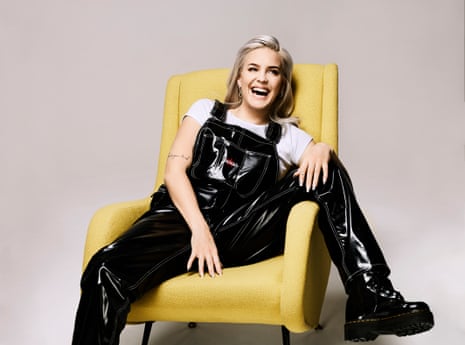Six days after the terrorist attack at the Bataclan in Paris in November 2015, the singer Anne-Marie was due to play the venue with the dance act Rudimental. The news poleaxed her. “It really just fucked me up,” she says. “I was in bed for three days and I could tell I was dealing with it differently to everyone else.” Other people’s emotions had always had a strong effect on her and the problem continued; the Grenfell tower fire last summer broke her for a week. She had always thought that she might have bipolar disorder, but a visit to a therapist gave her a different verdict. They told her she was, in fact, an empath (or, according to the psychologically recognised term, a “highly sensitive person”).
The result is that her moods are swayed profoundly by those around her. Seeing another songwriter look sad momentarily in a session once knocked her out. She almost intervened when she saw two passengers in a car look as though they were about to start fighting. Audiences are a minefield, especially at festivals. “I tend to see people leaving and think: ‘Oh my God, this whole place fucking hates me.’”
It is no surprise, then, that the stage set for her latest show, at Paris’s modern art museum, the Palais de Tokyo, is designed to make everyone feel as comfortable as possible. Framed photos of her with friends and family are scattered about; there are old lamps and checked pillows in an area intended for an intimate, mid-set sit-down. Given the venue, the homespun setup almost feels transgressive.

Photograph: Frank Hoensch/Redferns
Anne-Marie (her surname is Nicholson, but she goes by her first name) is comfort and cosiness incarnate backstage in a red flannel Kangol bucket hat, an oversized T-shirt emblazoned with the word “Paris” and knitted beige sweatpants. But comfort is not what springs to mind when you consider her biggest singles. There are the platinum-certified Alarm and Ciao Adios, which pan a cheating ex, and Friends, a recent collaboration with American DJ Marshmello, which bluntly disabuses a deluded wannabe paramour: “Want me to spell it out for you? F-R-I-E-N-D-S”. It has spent the last eight weeks in the Top 10.
These are not songs for sofa sobbing sessions. They are songs for Jägerbombs and sticky-dance-floor exorcisms. But even these are meant to help fans, says Anne-Marie, who is a few days off turning 27 when we meet. All her exes have cheated on her, she says, and at the time she could not tell them to do one as forcefully as she does in the songs. That has changed. “Now, I’m like: ‘Don’t fucking talk to me,’” she says in a withering Essex accent. “But before I wasn’t like that, so that was hard for me to get out of and become who I am. That’s why I try and tell people, ’cause I’ve gone through that experience,” she says, sighing.
Her determination to protect fans from romantic treachery chimes with the roles female pop stars are expected to play in 2018: agony aunt and inspiration as well as style icon and banger-machine. Anne-Marie’s debut album, Speak Your Mind, commits to her mission and expands her image from motivational speaker to whole, vulnerable person. Twisting her legs around her body and concentrating intently on her answers, she is far less bolshy than I had imagined from the face she puts across in her songs. She grasps for the right words, worries about being inarticulate (she is not) and talks in a matter-of-fact fashion about her difficulties with anxiety. Pop stars “letting their guard down” is a cliche of intimacy – but compared with Dua Lipa and Paloma Faith, the only other young, solo British women on the albums chart, Anne-Marie doesn’t seem to have any guard to put up. It is hard to imagine Lipa posting videos on Twitter of her singing earnest, self-written political songs.
The album has been a long time coming: it is now almost five years since her debut solo single, Summer Girl, which was released before she disappeared back into development and a live apprenticeship of sorts with Rudimental. She found healthy employment as a guest vocalist with Wretch 32, Gorgon City and Magnetic Man, thanks to her effortless knack for RihannaVoice – an affective instrument, by turns tropical, trebly and guttural – and shared last year’s Christmas No 1 with Clean Bandit and Sean Paul for Rockabye, an enjoyably odd tribute to single mothers.
Hers is a very 2018 pop CV, reflecting five years of change in which streaming has flattened sales and success feels more erratic than ever. Commenters on one pop forum reckon that Anne-Marie was meant to be more of an Adele, pointing to the stately Breathing Fire, which was abandoned as a single after Alarm blew up (Anne-Marie says pulling it was her decision). Turning female solo artists into pop stars has been hard in this era – only Dua Lipa has managed it – but Anne-Marie looks close.
Pop albums seem as relevant to the playlist era as diesel to an electric car and the length of time it has taken to make Anne-Marie’s may suggest it was low on the list of priorities for her label, Asylum. Why focus on an album that will inevitably include some filler when the singles are so ironclad? But she says she is pleased it has taken so long. As a teenager, she did musical theatre, became a world karate champion and did not like pop. It was not until the end of college, when a songwriter affiliated with Elton John’s Rocket Record Company asked her to sing on his demo, that she understood “you could write the songs”, she says.
If she had released an album five years ago, she would not be able to stand by it now, she says. Alicia Keys’ Songs in A Minor, Christina Aguilera’s Stripped and the Streets’ A Grand Don’t Come for Free were albums “that really made sense to me”, she says, so she wanted hers to do the same. She could not have written a song such as Perfect before: a descendant of Aguilera’s Beautiful that celebrates imperfections and comfort-eating macaroni cheese.
“I’ve become very aware of body issues and body confidence,” she says, adding that she still has issues with her body, relating to an earlier time in her life. “But I feel like I’ve taken time really figuring myself out to be able to talk about it now. If I’d written that same song five years ago, it’d be very different – even angry.” She took confidence from watching TED talks and accepted her figure as it is. (The fact that she is slim and athletic speaks to how crushing and indiscriminate body-confidence issues can be.) “Hearing other women talk about it makes you feel less alone, which is why big movements are so important.”
It was reading self-help book The Chimp Paradox and Daniel Kahneman’s Thinking Fast and Slow that helped her understand how her mind works: “There’s the initial reaction [you have to something], then there’s the reason you had that reaction and what you should feel about it – I really don’t think I have this [second] one.” She sings about being an empath on album highlight Machine (which includes the gothic line: “Every mistake I make is a consequence of my flesh”), but she has not had time to do anything about it. “I feel so weird at the moment,” she says. “I don’t think I can stop it – but I don’t want it to be blocked off. I just need to control it and get out of the emotion that I’m deep in.”
She talks about how it affects her anxiety. “I have a worry of people not liking me. I get scared walking into a room first, so I have to have people walk in before me so then people are distracted. It’s hard.” She has not had time to get to grips with that, either. Another songwriter explained that anxiety can manifest itself in different parts of the body. “I get it in my chest,” she says, seizing her torso. “I don’t know what spurs it yet, but I’ve got to learn.”
Anne-Marie became friends with Ed Sheeran through their shared record labels. The pair co-wrote her new single, 2002, a tribute to childhood – with a chorus referencing period hits by Nelly, *NSync and Britney Spears – in the vein of Sheeran’s Castle on the Hill. It is nakedly sentimental (and a slightly creepy depiction of 18-year-olds reminiscing about being in love aged 11), but its appeal makes sense in an age of anxiety. “It’s just remembering when you didn’t have many cares,” she says. “That’s always a really nice memory to have, when you didn’t have to pay bills or think about car insurance. I love listening to music from back then, ’cause it always takes me back to when I was running down the park with my mum and dad. I think that’s probably why they really make you feel good – I never really thought about it before.”
Her label would give her time off to deal with her anxiety if she asked for it, she says, but she is waiting for the right moment. “I don’t think you should wait until it’s really bad, to be honest, but I think, until something really drastic happens to me, that’s when I’ll be like, OK, I need to stop.” Last year, she had about three days off, but she always ended up asking for something to do – otherwise she would sit in bed crying and overthinking things. Given that she has been performing since she was two – dance, theatre, karate, school, budding pop stardom – it sounds like she needs structure to maintain control. “I never really thought I had that issue – [I thought] it was just a short attention span,” she says. “But I’m starting to learn that I do feel like I need a lot of control, even if it’s packing my bags. Which is a good thing, because I don’t really want someone to have control over my career.”
None of this is said with self-pity. Anne-Marie is casually introspective and, despite dealing with some emotional tumult, seems subtly determined. “I’ve always been the kid to want to do anything and everything,” she says. “When I was four, five, my grandad took me over to the park to play basketball. There was no way I was getting a ball into the net, but he said we stayed there until I got it in. I always remember that. He used to say to me: ‘When you think you’re going to do something, you won’t ever stop.’ I think that’s the person I’ve been all my life.”
Speak Your Mind is released on Asylum/Atlantic on 27 April. 2002 is released today

Comments (…)
Sign in or create your Guardian account to join the discussion